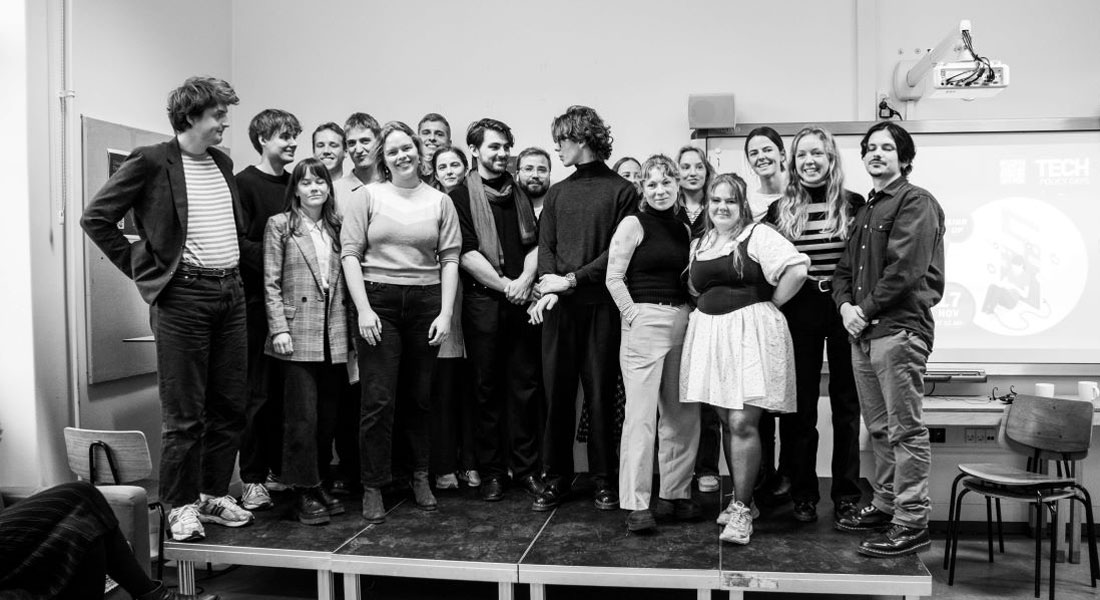25 Students Join Forces to Reshape Tech Policy
The CPH Tech Policy Youth Committee has now been formed – with 25 students ready to engage in the field of tech policy.

To underscore the importance of youth engagement in shaping the future of tech policy, we have formed the CPH Tech Policy Youth Committee. The youth committee brings together bright, young minds from different universities and aims to bridge the gap between emerging technologies and informed policy-making.
The Committee was launched at an event at the Copenhagen University Friday the 17th of November as a part of Tech Policy Days.
I think it is important to get our perspective on the development and provide a platform for young people to voice their concerns and engage in conversations around tech policy.
This collaboration brings together students from various academic backgrounds, including psychology, sociology, political science, law, economics, and social data science, who will work together to tackle some of the polict challenges posed by technology in the 21st century.
One of the new members of the committee is 26-year old Viktoria Toldi. She has studied web development, is now finishing her master degree in Social Data Science at the University of Copenhagen, and has hands on experience with digital technology as well as a societal and international perspective on tech.
She has joined the committee with an ambition to engage in a debate about how knowledge and use of technology can become more evenly distributed – and not contribute to reinforcing inequality in society.
“Kids from families with low resources typically have less tech literacy. How the education system can balance this better, is one of my great concerns.”
Viktoria Toldi has also joined the committee because she is looking forward to discussing ideas with students from other backgrounds. She thinks the perspectives of a younger generation is crucial in the tech policy field.
“We are millennials and Gen Zs – that means we have grown up with technology in a completely different way than previous generations. I think it is important to get our perspective on the development and provide a platform for young people to voice their concerns and engage in conversations around tech policy."
Information needs to be trustworthy
All members of the committee meet once a month, and they have formed different groups where they will be working on everything from policy briefs to hosting events or trying to engage the public through opinion pieces in the media.
Another member of the new committee, 24-year old Lucas Honoré, a student of political science at the University of Copenhagen, has a big interest in the development of democracy, rights, and the role of misinformation:
“We need to be able to trust our political debate, and the companies facilitating this debate on their platforms have a responsibility to limit misinformation and ensure that trustworthy information is accessible."
Lucas Honoré is also engaged in the rapid development of AI – and he is hoping the committee can get more young people engaged in this debate.
The CPH Tech Policy Youth Committee will collaborate with the CPH Tech Policy Committee. The Copenhagen Center for Social Data Science (SODAS), the Crown Princess Mary Center and the department of Political Science will continuously support the students and facilitate contact to academics and policy professionals.
Clara Jeanneret Skovgaard (Anthropology)
Alexander Blankholm (Math-Econ)
Alžběta Petrův (Applied Cultural Analysis)
August Maigaard Rubin (Communikation & IT)
Björk Mo van Dijk Madsen (Philosophy)
Cecilie Vitus Brix Nielsen (Psychology)
Christian Skettrup (Law)
Emma Skjold Lindegaard (Politics and government)
Evangelos Moustaklis (Security Risk Management)
Johannes Lau Uhrenholt Holm (Law)
Kristian Sick Svendsen (Communication and IT)
Lucas Honoré (Political Science)
Lukas Garly (Law)
Marianne Kramer (Social Data Science)
Marie Skovbye (Psychology)
Morten Hybschmann (Political Science)
Patrick Nieznanski (Business Administration & Philosophy)
Peter Møller Thomsen (Political Science)
Sofie Myrup Melchiorsen (Political Science)
Søren Blatt Bendtsen (Business Analytics)
Viktoria Toldi (Social Data Science)
Vilhelm Juhler Kjær (Social Data Science)
Petrea C. B. Wagner (Digital Innovation & Management)
Milo Schul (Anthropology)
Line Kristoffersen (Political Science)
